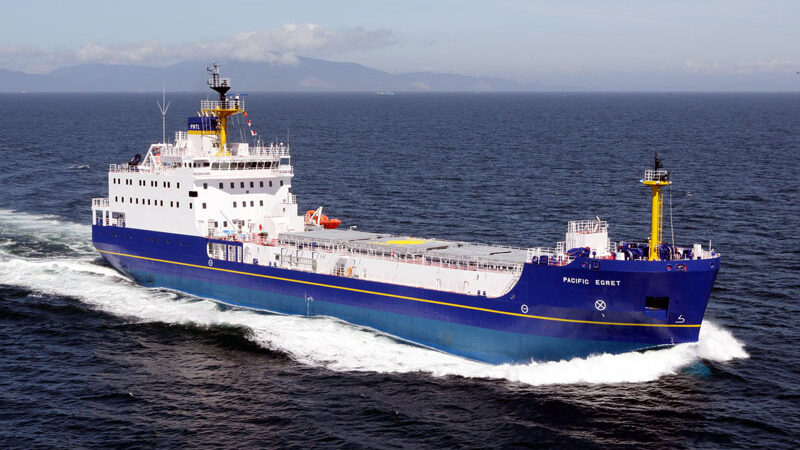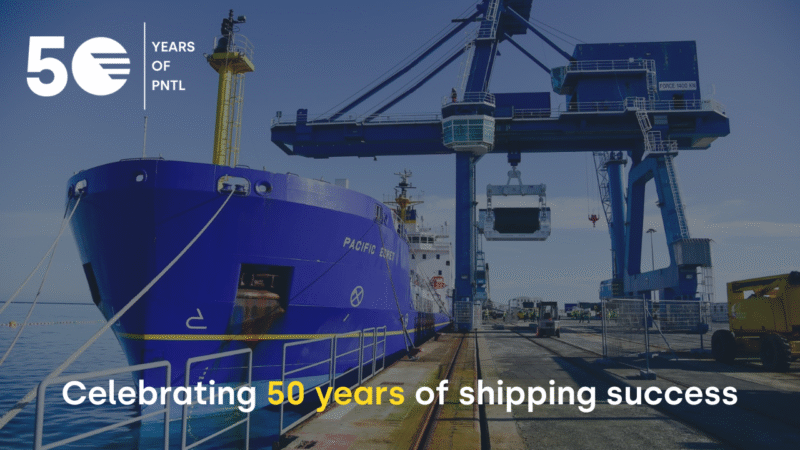Second Japan waste shipment poised to commence
The programme of returning solid highly active waste (HAW) from Sellafield to Japan will continue in the near future with the departure of the second consignment of waste from Sellafield.
Three transport flasks, containing 76 canisters of HAW, will depart Sellafield site by rail before being transported by sea from the UK to Japan. The vessel that will be used will be the Pacific Grebe, owned by Pacific Nuclear Transport Ltd (PNTL), a subsidiary of International Nuclear Services (INS).
For security reasons, the route and approximate duration of the journey will be made public only after the vessel’s departure.
This waste shipment will be the maiden operational voyage of Pacific Grebe, a second-generation purpose-built PNTL vessel that entered service in December 2010. One of three new vessels, Pacific Grebe incorporates in its design and operation the experience gained from PNTL’s 25 years of safe nuclear transports. In total INS and PNTL have 40 years of experience in nuclear transports and travelled more than five million miles without any incident involving the release of radioactivity.
Matt Fox, head of marine operations at International Nuclear Services, said: “This transport has been meticulously planned in conjunction with Sellafield Ltd and our Japanese customers. These transport plans have been approved by the necessary independent regulators who have given their consent that it can take place.
“This is the fourteenth such transport from Europe and the second from the UK making it a safe, secure and tried and tested of shipping nuclear waste.”
The transport flasks in which the HAW is contained are extremely robust and are designed, tested and modelled to exceed the very robust standards set by the International Atomic Energy Agency. They weigh approximately 130 tonnes when loaded, about 90% of which is dedicated ensuring safety, with the remainder being waste.
The decade-long programme for repatriating waste is called the vitrified residue returns (VRR) programme. Sellafield Ltd’s VRR Programme Manager, Will Watson said: “Repatriating this waste will reduce the amount of overseas material held at Sellafield, fulfil UK Government policy and mark the delivery of contracts for waste management on behalf of the Nuclear Decommissioning Authority. It will also continue to help in our goal to make Sellafield cleaner, safer and more productive.
“This latest step in the programme is the culmination of years of work between Sellafield Ltd, INS and our Japanese customers and we are confident that this second voyage will be as safe and successful as the first one a year ago.”
The waste arises from the reprocessing of used nuclear fuel at Sellafield for the Nuclear Decommissioning Authority’s Japanese customers. HAW is therefore being returned to customers in accordance with contractual obligations and UK government policy. Current UK policy states that waste arising from contracts for reprocessing signed with overseas customers since 1976 is to be returned to the customer of origin.
The PNTL fleet, which is operated by INS, has safely transported more than 2,000 flasks of nuclear material.
ENDS
For more details, please contact Ben Todd at INS:
T: 01925 832655
M: 07738 039640
E: [email protected]
Editor’s notes
INS is the world’s leading global transporter of nuclear materials and has a world class safety record with more than 40 years and five million miles travelled without any incident involving the release of radioactivity
INS is a wholly-owned subsidiary of the UK Government’s Nuclear Decommissioning Authority (NDA)
INS has three roles:
- it is the NDA’s commercial agent tasked with managing existing fuel cycle contracts that the NDA has with customers as well as developing new business to gain maximum value from the NDA’s assets
- it provides transport solutions for customers around the world, from joining together the different parts of the nuclear fuel cycle to providing a vital secure transport link in global non-proliferation efforts
- it provides nuclear fuel cycle, licensing, transport package and logistics consultancy services to customers
INS is the majority shareholder in Pacific Nuclear Transport Ltd, whose other shareholders include Areva NC and Japanese electric power companies and trading companies.
INS employs around 145 people and has offices in Warrington and West Cumbria in the UK, as well as in Germany, France and Japan. Barrow Marine Terminal has been the home port of PNTL since 1969
The PNTL fleet currently consists of the Pacific Heron, Pacific Egret, and Pacific Grebe, all of which are classed by the Maritime and Coastguard Agency as INF3 vessels
INS also operates an NDA vessel called Oceanic Pintail, an INF3 vessel. It also operates the Atlantic Osprey, which is a multi-purpose cargo carrier and is classed as an INF2 vessel, which means it is licensed to carry smaller quantities of nuclear materials
The INF code is the international code for the safe carriage of packaged Irradiated Nuclear Fuel, plutonium, and high-level radioactive waste on board ships. It defines three classes of ships, depending on the total radioactivity of cargo which is carried on board:
- INF 1 ship: Ships which are certified to carry INF cargo with an aggregate activity less than 4×103 TBq (TeraBecquerel = measurement of radioactivity).
- INF 2 ship: Ships which are certified to carry irradiated nuclear fuel or high-level radioactive wastes with an aggregate activity less than 2×106 TBq and ,ships which are certified to carry plutonium with an aggregate activity less than 2×105 TBq.
- INF 3 ship: Ships which are certified to carry irradiated nuclear fuel or high-level radioactive wastes and ships which are certified to carry plutonium with no restriction of the maximum aggregate activity of the materials.

